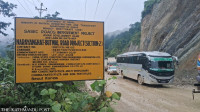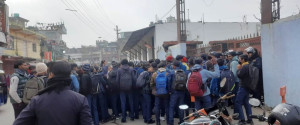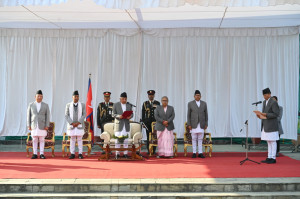National
Nepal joins 150 countries in bid to wipe out polio
Health teams of Nepal have joined forces with those from 150 countries in a final push to eradicate polio virus by adopting a new vaccine. Though Nepal has seen no new cases since August 2010, porous border with India retains the risk of spreading the disease.
Manish Gautam
Health teams of Nepal have joined forces with those from 150 countries in a final push to eradicate polio virus by adopting a new vaccine. Though Nepal has seen no new cases since August 2010, porous border with India retains the risk of spreading the disease.
The Ministry of Health will now administer bivalent polio vaccine (boPV) from trivalent polio vaccine (toPV) that has been effective in curbing two types of polio virus. There are altogether three types of polio virus—type 1; type 2 and type 3. Among them, type-2 virus has not resurfaced since 1999 and health experts said there is no need to use the drug any further.
“Removing the type-2 virus from the vaccine would halt the chance of circulating vaccine-derived virus while making the campaign to fight other types of polio effective,” said Dr Rajendra Pant, chief of Child Health Division at the Department of Health Services.
Nepal has not seen any cases of polio since August 2010 when six cases were reported. A 22-month baby girl from Rautahat was the last case that the government recorded on August 30 that year.
Recognising its effort to contain the virus, the World Health Organisation certified Nepal as polio-free country in March 2014. Experts believe that given the porous border, India’s aggressive fight against polio has helped Nepal maintain the polio-free status but risks remain yet.
According to the global eradication plan that Nepal has adopted, the boPV vaccine will be administered to children 6-10 weeks old, while the Inactivated Polio Vaccine (IPV) will administered to those 14 weeks of age under the government’s routine immunisation programme.
“The three polio vaccine doses protect newborns from all three types of polio,” said Dr Pant.
With the switch to new vaccine, the CHD plans to destroy at least 12,000 vials of vaccine in stock across the country. Dr Pant said they have already mobilised vaccine officers to retract the toPV vaccine from vaccination centres across the country and dispose it.
Polio is an infectious disease that affects the nervous system and can cause paralysis. The main transmission occurs when person consumes goods laced with faeces of polio-affected persons.
Following the worldwide campaign to eradicate polio that kicked off in 1988, Nepal started immunising children with polio vaccine. Polio got particular focus since 1996 when the government started marking National Immunisation Day. More than 600,000 newborns are now administered with polio vaccine each year.




 12.88°C Kathmandu
12.88°C Kathmandu







%20(1).jpg&w=300&height=200)






